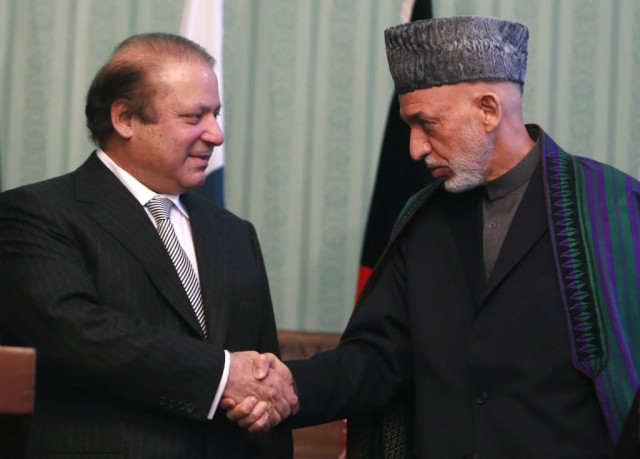Neighbourhood watch: Cautious optimism surrounds Nawaz’s visit to Kabul
The premier agreed to facilitate meetings between Afghan officials and Mullah Baradar.

Publicly maintaining their calm, the Afghan Taliban, however, privately expressed ‘shock’ over the treatment of their former deputy chief. PHOTO: REUTERS/FILE
Karzai, who initially blocked attempts at peace talks with the Afghan Taliban, is now anxious his negotiators talk with Baradar in Pakistan. The former second-in-command of the insurgent movement, Baradar – like many other Taliban members ‘released’ by Pakistan – has not yet been allowed to reunite with his family.

Much to the surprise of others during his Kabul visit, Sharif stated “anybody sent by the Afghan president to Pakistan to hold talks with Mullah Baradar will be allowed to do so.” Sharif’s National Security Adviser Sartaj Aziz also officially confirmed on Wednesday that members of the Afghan High Peace Council met Baradar last month.
Publicly maintaining their calm, the Afghan Taliban, however, privately expressed ‘shock’ over the treatment of their former deputy chief, who is still highly respected by the insurgents.
A Taliban official requesting anonymity told The Express Tribune Mullah Baradar had previously refused to meet Afghan officials during his three-year detention. “All these efforts are useless because no prisoner can represent the Islamic Emirate of Afghanistan,” he said.
Sharif’s pledges, nonetheless, have raised hopes of a meaningful reconciliation process in Afghanistan at a time when international troops are drawing down. However, some sections of the Afghan media remain suspicious of Pakistan’s intentions.
Privately-owned daily Arman-e-Melli wrote in an editorial that Pakistan plays a key role in ensuring peace in the country and facilitating negotiations will lay the foundation to build trust between the two countries. “We hope this (Sharif’s) visit will mark the beginning of a new era of good relations,” read a December 1 editorial.
More to the point, Weesa, another daily, urged Sharif and Karzai to stop issuing hollow statements and instead take practical steps to revive confidence-building working groups that address security threats faced by both nations.

The Afghan media in general has always remained skeptical and critical towards Pakistan even if it pursues policies favourable to its neighbour. State-owned Hewad accused Pakistan of having a ‘bad track record’ and that “it must back its words with deeds if it intends to gain trust.”
A December 2 editorial bashed Pakistan for not pressurising the Afghan Taliban to hold talks with the government. “If Pakistan does not give guarantees, its pledges can never be trusted and the recent talks between the Afghan and Pakistani leaders cannot be implemented either,” said the daily.
Numerous attempts have been made to improve ties between the countries since Sharif took charge. President Karzai visited Islamabad in August, followed by Sartaj Aziz’s visit to Afghanistan ahead of Sharif’s on November 30.
The beleaguered Afghan president, whose clock is closing in, is genuinely concerned about the uncertainty surrounding the peace talks. Karzai only has four months to set the future course for the country before he steps down as president. Pakistan, however, should be wary of fully entertaining Kabul’s demands as forcing the Afghan Taliban towards peace talks could prove counterproductive.
Published in The Express Tribune, December 7th, 2013.



















COMMENTS
Comments are moderated and generally will be posted if they are on-topic and not abusive.
For more information, please see our Comments FAQ